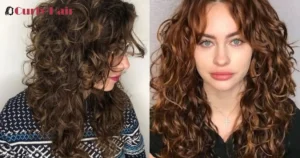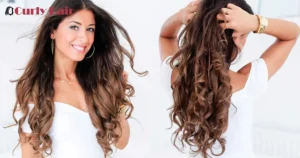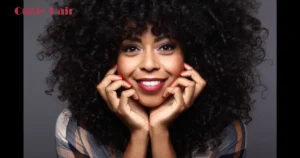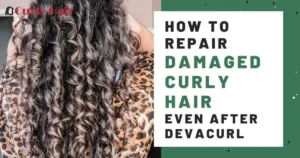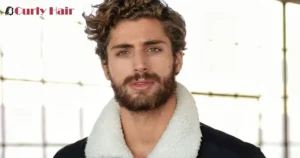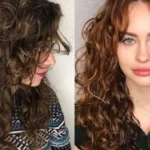Curly hair is uniquely beautiful but requires extra care to stay healthy and maintain its bounce, definition, and overall strength. One of the most talked-about elements in curly hair care is protein and curly hair, but does curly hair truly need protein, or is it just another trend in the haircare world?
In this article, we’ll explore the connection between protein and curly hair, how to determine if your hair needs protein, and what experts recommend for maintaining strong, well-defined curls.
Experts suggest that protein treatments can be a game-changer for hair types that are damaged or lacking structure. If your hair feels mushy, dry and brittle, or over-moisturized, a dose of protein may help restore strength and support your natural curl pattern.
Key Takeaways
- Curly hair that is damaged, limp, or lacking in protein may benefit from protein treatments.
- Protein and moisture must be balanced for healthy hair types—too much of either can cause problems.
- Signs of protein deficiency include breakage, limp curls, or a weakened hair cuticle.
- Overusing protein can lead to protein overload, making hair stiff and brittle.
- Hydration and deep condition treatments help maintain protein moisture balance for strong, flexible curls.
What Is Protein and Why Is It Important for Hair?
Protein, primarily keratin, is a key building block of hair, giving it strength, elasticity, and structure. Every strand of hair has a hair cuticle, the outer protective layer that determines how well hair retains moisture and resists damage.
When this cuticle is weakened due to heat styling, chemical treatments, or environmental factors, hair can become dry and brittle. For curly hair, protein is especially important because the natural twists and bends make it more prone to breakage and moisture loss.
A dose of protein in your routine can help strengthen the strands, repair damage, and improve your curl pattern, making your curls look healthier and more defined.
How to Know If Your Curly Hair Needs Protein?
Not sure if your hair needs protein? Here are some common signs that your curls may benefit from a protein treatment:
- Hair feels limp and lifeless: If your curls lack bounce, even after washing, they may be lacking in protein.
- Excessive breakage: Hair that snaps easily, especially when detangling, may have a weakened hair cuticle that needs reinforcement.
- Mushy or over-moisturized curls: If your hair feels dry in some areas but overly soft in others, it may have too much moisture and not enough protein.
- Stretched-out curl pattern: Protein helps reinforce the natural curl type, so if your curls appear loose or undefined, a dose of protein might be needed.
Protein vs Moisture Striking the Right Balance
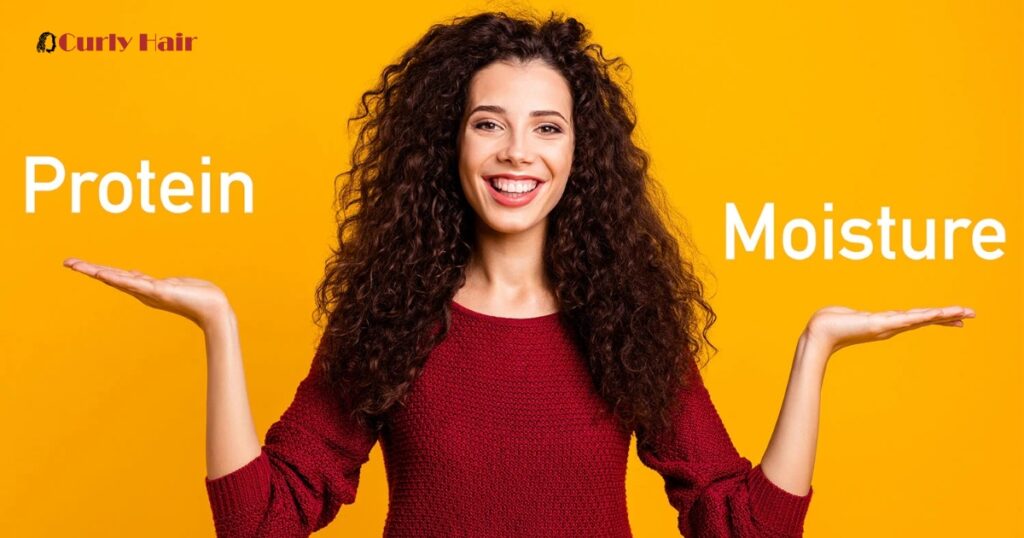
Curly hair thrives when there is a proper protein moisture balance.
- Protein strengthens hair by rebuilding damaged areas and supporting the hair cuticle.
- Moisture keeps curls soft, flexible, and hydrated, preventing stiffness and breakage.
If this balance is disrupted, issues like dry and brittle hair, frizz, or excessive breakage can occur. Your curl type and hair porosity play a role in determining how much protein your hair needs:
- High porosity hair often benefits from protein treatments to fill in gaps and prevent moisture loss.
- Fine hair or low porosity hair needs less frequent protein, as it retains protein more easily.
Understanding your curl type and porosity helps determine the right approach to keep your curly hair strong and healthy.
What Experts Recommend for Protein Treatments
Experts recommend starting with a protein treatment once a month to maintain protein moisture balance and prevent damage. Here’s how to incorporate protein and moisture into your routine:
- For Regular Maintenance: Use lightweight hair treatments with hydrolyzed proteins like keratin or silk.
- For Deep Repair: Intensive protein masks work best for high porosity hair or chemically damaged curls.
- Follow Up with Moisture: After a dose of protein, always deep condition to maintain hydration.
Pay attention to how your hair feels after a treatment. If your curls become stiff or dry, reduce the frequency or opt for a lighter protein treatment.
Best Protein Treatments for Curly Hair
The best protein treatments for curly hair strengthen and hydrate without causing protein overload.
- Protein-enriched masks: Deeply nourish and restore elasticity to damaged curls.
- Leave-in conditioners with hydrolyzed proteins: Provide lightweight strength for daily maintenance.
- DIY protein treatments: Natural ingredients like eggs or yogurt offer a cost-friendly dose of protein.
No matter which option you choose, always deep condition afterward to ensure your hair feels balanced and hydrated.
When Curly Hair Doesn’t Need Protein
Not all curly hair needs protein all the time. If your curls are:
- Strong, bouncy, and well-defined
- Showing minimal breakage or frizz
Then your hair likely has enough protein. Adding unnecessary protein can lead to protein overload, making hair dry and brittle. Instead, focus on hydration and deep condition treatments to maintain healthy hair types.
How to Avoid Protein Overload?
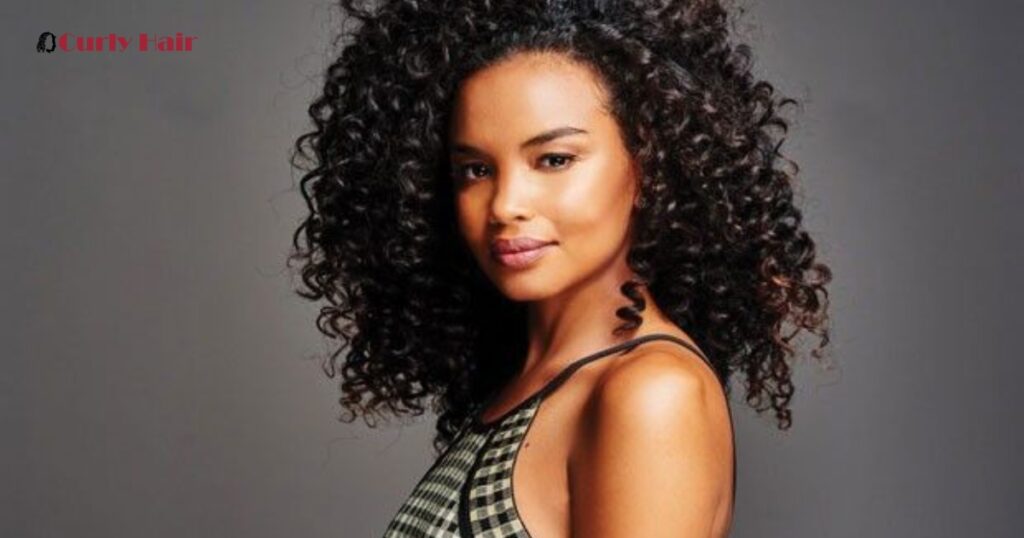
Protein overload occurs when hair receives too much protein, making it stiff and fragile. To prevent this:
- Assess your hair’s condition regularly to ensure protein moisture balance is maintained.
- Use protein treatments only when your hair feels weak or lacks definition.
- Balance protein and moisture by alternating between protein masks and deep condition treatments.
- Avoid layering multiple protein-heavy products in your routine.
Conclusion
The relationship between protein and curly hair is key to maintaining strong, defined, and healthy curls. Protein strengthens hair, repairs damage, and restores natural shape, but not all hair types need protein treatments all the time.
To achieve the right protein moisture balance, listen to how your hair feels. If your curls are limp, frizzy, or prone to breakage, a dose of protein can help. But if your hair feels stiff or dry and brittle, focus on hydration and deep condition treatments instead. Moderation is key!
Frequently Asked Questions
Do I need a protein treatment for curly hair?
Yes, if your hair feels limp, frizzy, or prone to breakage, a dose of protein may help.
Can curly hair get weighed down?
Yes, curly hair can get weighed down by heavy products or excessive moisture, affecting its curl pattern.
How do I know if my curly hair needs protein?
If your curls appear limp, stretched out, or feels dry, you may need a protein treatment.
Can too much protein damage curly hair?
Yes, excessive protein can lead to protein overload, making hair stiff and prone to breakage.
How often should I do a protein treatment on my curly hair?
It’s recommended to apply a deep protein treatment every 4 to 6 weeks to strengthen and repair curly hair.
Can I do a protein treatment at home, or should I go to the salon?
While at-home protein treatments are available, it’s advisable to have them performed at a salon, especially if you’re new to the process, to ensure proper application and avoid potential damage.
What should I do after a protein treatment?
After a protein treatment, it’s essential to apply a deep moisturizing product to restore the protein-moisture balance and prevent hair from becoming brittle.



